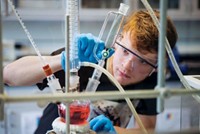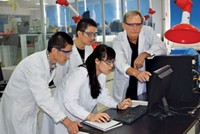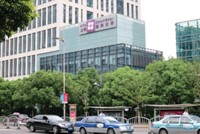Advertisement
Grab your lab coat. Let's get started
Welcome!
Welcome!
Create an account below to get 6 C&EN articles per month, receive newsletters and more - all free.
It seems this is your first time logging in online. Please enter the following information to continue.
As an ACS member you automatically get access to this site. All we need is few more details to create your reading experience.
Not you? Sign in with a different account.
Not you? Sign in with a different account.
ERROR 1
ERROR 1
ERROR 2
ERROR 2
ERROR 2
ERROR 2
ERROR 2
Password and Confirm password must match.
If you have an ACS member number, please enter it here so we can link this account to your membership. (optional)
ERROR 2
ACS values your privacy. By submitting your information, you are gaining access to C&EN and subscribing to our weekly newsletter. We use the information you provide to make your reading experience better, and we will never sell your data to third party members.
Careers
Hong Kong’s Education Overhaul
Reforms to undergraduate curriculum aim to push the country toward innovation by unleashing students’ creativity
by Linda Wang
September 2, 2013
| A version of this story appeared in
Volume 91, Issue 35

As far as educational reforms go, Hong Kong’s most recent experiment may be among the most ambitious. During the 2012–13 academic year, the former British colony converted all eight of its publicly funded universities from a British-style, three-year undergraduate curriculum to a more international four-year curriculum used by countries such as the U.S.
These changes follow 2009 reforms to the secondary school curriculum. The duration of high school was shortened to three years from four, and the emphasis on testing as the primary measure of academic success was shifted to a more holistic approach to education that aims to give students a more meaningful academic experience.
Hong Kong’s government hopes that by revamping the undergraduate system to focus less on test scores and more on rewarding students for their creativity, the country will not only cultivate future leaders but also position itself as a global force in science and technology innovation. What this transition means for chemistry departments at Hong Kong institutions is that they now have a unique opportunity to reinvent their curricula and introduce new and innovative approaches to teaching and motivating their students.
“In Asia, the creativity is there, it’s just not being unleashed in the very examination-oriented system,” says Shuk-han Cheng, a professor of biology and chemistry at City University of Hong Kong. “The students understand now that when they get to the university, they will be rewarded for taking risks.”
CityU is trying to stimulate more creativity among its students through its new Discovery-enriched Curriculum, which encourages undergraduates in all majors to make at least one new discovery during their time at the university.
“We want our students to graduate having explored the unknown, having been able to create something original, and having the self-confidence that accompanies that kind of process so that they are in a position to make important contributions throughout their professional careers,” says Arthur B. Ellis, provost of CityU. “We expect that many of these students will become leaders in their fields for that reason.”
Early indications are that this approach is changing students’ attitudes toward learning. Ada Lau, who is entering her second year and majoring in chemistry at CityU, spent the summer conducting research with teammates in CityU’s new Addicted to Discovery program, which is geared toward undergraduates with an interest in science and engineering. The program gives first-year students hands-on research experience that focuses on one of their childhood.
Yun Lam, an associate biology and chemistry professor who directs the program, says that in the past, undergraduate research was typically done in the final year of college. Now, under the Discovery-enriched Curriculum, the university encourages students to start doing research immediately. “We want them to have their first taste of discovery their first year,” Lam says. In addition, by exploring one of their childhood questions, students are more likely to find their research engaging.
Lau says her initial idea for a research project was to look for anticancer properties in snake venom. Despite the potential risks involved, the university supported her. “If the school banned my idea immediately, it would be like banning my curiosity,” she says. Because of practical issues such as time and cost, Lau instead decided to focus her research on the anticancer properties of foods. She has already found promising leads in natural products such as aloe vera.
“We want to tell students that making a discovery is something everybody can do every day,” Lam says. “We want people like Ada Lau to be addicted to making discoveries.”
The conversion to a four-year curriculum has also led to new programs at Hong Kong University of Science & Technology. Zhenyang Lin, who heads the university’s chemistry department, says the university needs to adapt to keep up with the changing needs of the world, where students need to be more interdisciplinary.

The chemistry department has expanded its offerings for students interested in the chemical sciences, adding a number of new courses in areas such as materials and energy, and separations science. In the past, students could major only in chemistry, but now they can concentrate in areas such as materials chemistry or environmental chemistry. The university has also created double-degree programs. Lin hopes the expansion of options available to chemistry students will translate into more job opportunities for them when they graduate.
Hong Kong Baptist University (HKBU) is also focusing on career development and increasing job prospects for its students. During the past academic year, the chemistry department created a new bachelor’s degree in analytical and testing sciences.
Ricky Wong, head of the university’s chemistry department, says the new degree is geared toward students who want a career in Hong Kong’s booming analytical sciences industry. “Hong Kong doesn’t have a big chemical industry,” he says. “One of the chemical-related industries is the analytical testing industry. In this part of the world, food safety is a serious issue.”
The new major is a hit with students. Tin Yan Ha, who is entering her second year at HKBU and is an analytical and testing sciences major, says she applied to the university specifically because of this new program. She intends to pursue a career in food and analytical testing.
At Hong Kong Polytechnic University, the chemistry department is pouring more resources into undergraduate research. The university has even hired teams of specialists to help its undergraduates find opportunities to engage in independent research both within the university and outside it. Wing-tak Wong, who heads the department of applied biology and chemical technology, says he believes this investment will lead to greater research productivity by the school.

The University of Hong Kong (HKU)sees the transition to a four-year curriculum as a boon for its international exchange programs with other countries that also use the four-year curriculum. Vivian Yam, a chemistry and energy professor, says HKU has one of the most internationally diverse student bodies in the region, so having a more international curriculum will promote even more exchanges with countries such as the U.S. and China.
Shing Bong (Terry) Lou, an undergraduate chemistry major at HKU, will spend the upcoming academic year as a visiting student at Cambridge University. He hadn’t planned on studying abroad initially, but because HKU encourages students to participate in international experiences, and under the four-year curriculum he will still be able to graduate on time, Lou decided to take the plunge. “This is a great opportunity to challenge myself,” he says.
Although each university is taking a different approach to implementing the reforms, what’s common among all of the universities is that undergraduates now have an additional year to take courses that interest them. Furthermore, under the three-year curriculum, students had to choose their major at the outset and had little room for other courses; they can now wait until their second year to declare a major.
“We don’t want to confine them. We want to let them choose and think about what they like,” says Lin of Hong Kong University of Science & Technology. “It’s giving them more flexibility.”
“We will have more enthusiastic students if they really want to major in chemistry,” Yam says.
Many of the universities have created new courses to appeal to a range of interests. CityU, for example, now offers roughly 200 electives from which first-year students can choose. These electives are interdisciplinary and include topics such as “Science in Chinese Kung Fu,” “Poetry and Science,” and “The Biochemistry of Attraction.”
The transition, which took more than five years of planning and preparation, was not without its challenges. Because undergraduates now start college a year earlier than before, they have had fewer courses in fundamental subjects such as chemistry and mathematics. To bridge the gap, chemistry departments have had to create new general chemistry courses for first-year students in the new four-year curriculum.
The additional courses and students put an enormous strain on Hong Kong universities’ faculty and resources: The 2012–13 academic year involved a double cohort in which the final group of three-year students entering each university overlapped with the first group of four-year students. At Hong Kong Polytechnic University, for example, the general chemistry lecture, which previously had a maximum of 100 students, last year had more than 300 students. Many of the universities have had to hire new faculty to handle the additional workload.
Yam acknowledges that it’s been a tremendous amount of work for faculty, but “everyone is happy to do it because we want to be part of this transition to help shape the future of Hong Kong and to remain globally competitive.”
And the investment does seem to be paying off. “When I first came to CityU three years ago, one of the concerns I heard expressed fairly often from faculty was that they wished students would ask more questions and be more engaged in the material, and that’s happening now,” Ellis says. “Because we’re encouraging this kind of creativity, imagination, and asking of questions, it’s really changing the way the campus operates.”
“The students are really enjoying first-year chemistry lessons now because it’s not about passing exams, it’s about how exciting chemistry as a scholarly subject can be,” says Cheng. When these students “move up the career ladder and become more influential in society, you can foresee that they will be changing where Hong Kong is going.”





Join the conversation
Contact the reporter
Submit a Letter to the Editor for publication
Engage with us on Twitter